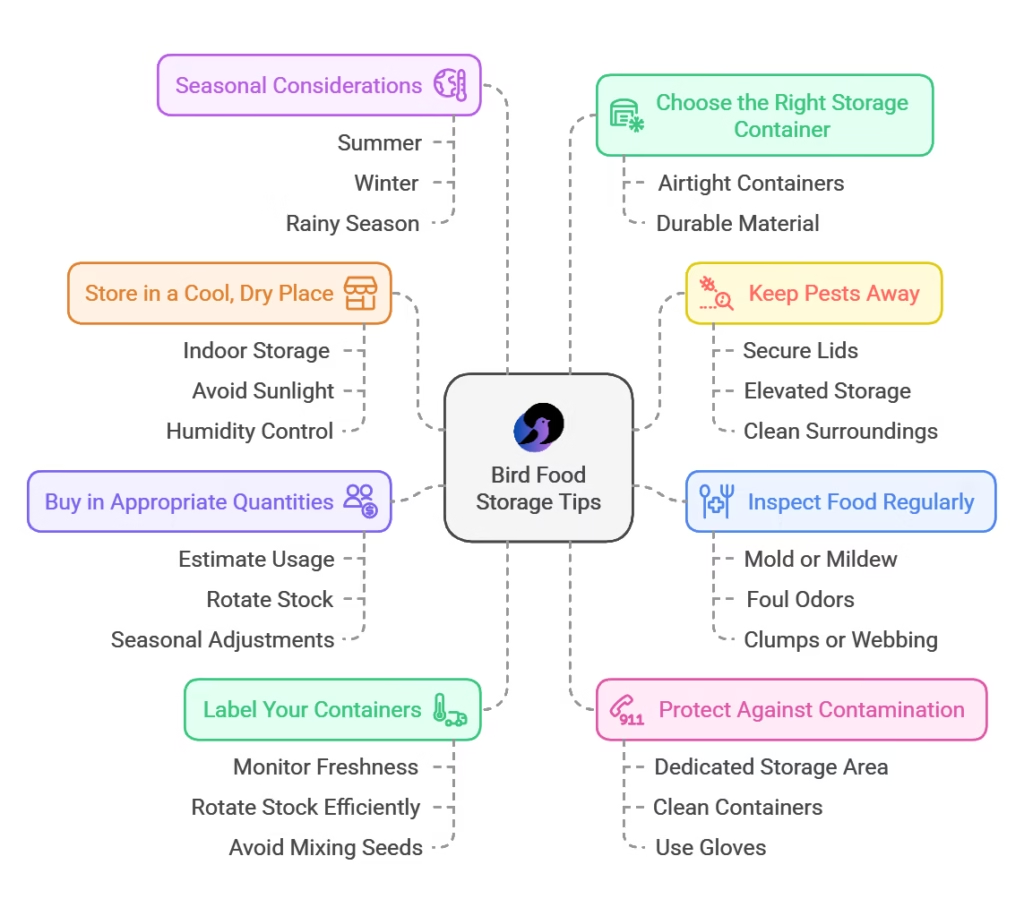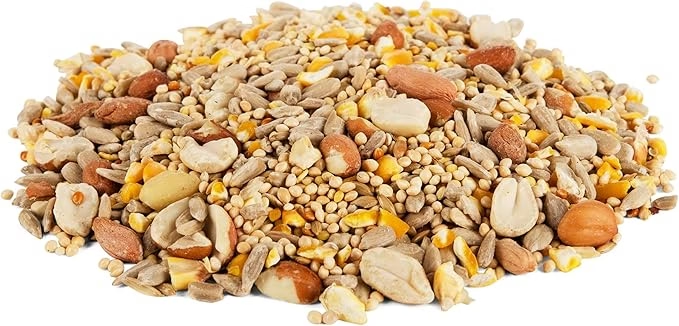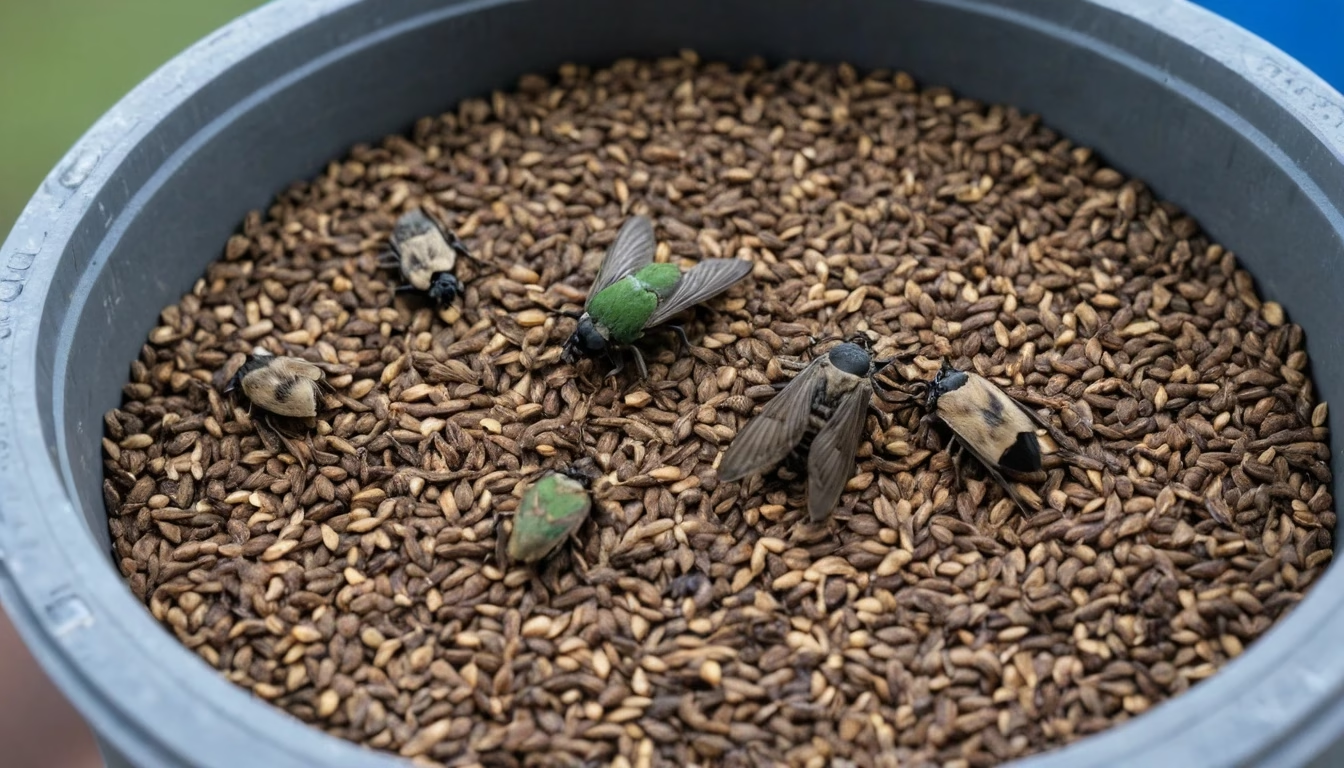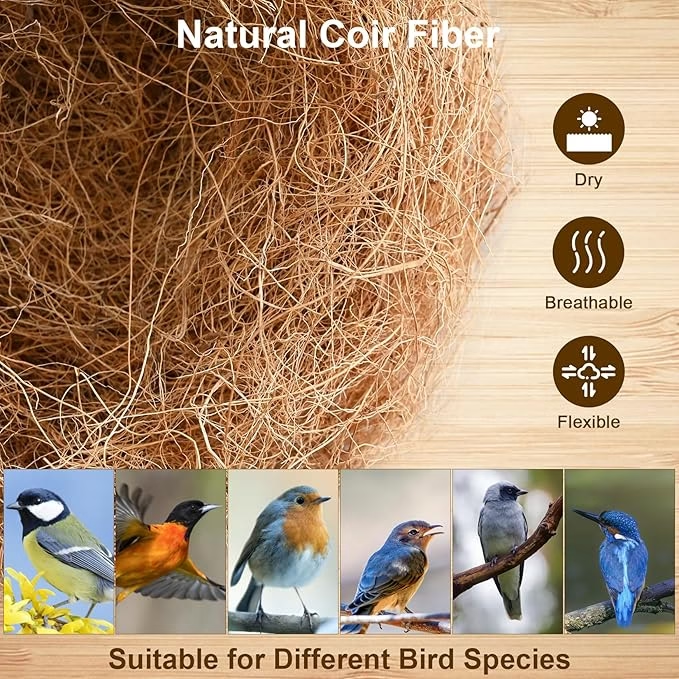Bird feeding is a rewarding activity that brings nature closer to your ho me. However, ensuring that the food you provide to your feathered friends remains fresh and safe is crucial. Proper storage not only maintains the nutritional value of the seeds but also prevents spoilage and contamination. Here are some essential tips to help you store bird food effectively and keep your backyard visitors healthy and happy.

1. Bird Food Storage Tips: Choose the Right Storage Container
The first step in maintaining the quality of bird food is using the right container. Here are some key factors to consider:
- Airtight Containers: Prevent moisture from entering, keeping the seeds dry and fresh.
- Durable Material: Opt for containers made of metal or heavy-duty plastic to prevent rodents or insects from chewing through.
- Easy Access: Choose a container with a wide opening for convenient refilling.
Recommended Storage Options:
- Metal bins with locking lids
- BPA-free plastic storage tubs
- Food-grade storage bags with resealable tops
2. Store in a Cool, Dry Place
Heat and humidity are the enemies of bird food. Excess moisture can cause seeds to become moldy, while heat can reduce their nutritional value. Follow these guidelines:
- Indoor Storage: Keep the containers in a garage, shed, or pantry where temperatures are stable.
- Avoid Sunlight: Direct sunlight can heat the container and spoil the food.
- Humidity Control: Use silica gel packets or dehumidifiers in storage areas prone to moisture.
3. Keep Pests Away
Rodents, insects, and other pests can contaminate bird food, making it unsafe for birds. To prevent this:
- Secure Lids: Ensure all storage containers have tightly sealed lids.
- Elevated Storage: Place containers on shelves or stands to make them less accessible to pests.
- Clean Surroundings: Regularly sweep and clean the storage area to remove any spilled seeds that might attract pests.
4. Inspect Food Regularly
Check your bird food periodically to ensure it remains fresh and safe. Look for:
- Mold or Mildew: Discard seeds that show signs of spoilage.
- Foul Odors: Fresh seeds should have a neutral, earthy smell.
- Clumps or Webbing: These are signs of moisture or insect infestation.
Dispose of spoiled food properly to avoid attracting pests to your yard.
5. Buy in Appropriate Quantities
While buying bird food in bulk can save money, storing large amounts increases the risk of spoilage. Instead:
- Estimate Usage: Calculate how much food your birds consume weekly and buy accordingly.
- Rotate Stock: Use older food first to ensure nothing goes to waste.
- Seasonal Adjustments: Reduce purchases during months when bird activity decreases.
6. Label Your Containers
To keep track of your bird food, label each container with the type of seed and the purchase date. This practice helps you:
- Monitor freshness
- Rotate stock efficiently
- Avoid mixing different types of seeds unintentionally
7. Protect Against Contamination
Cross-contamination can harm birds if spoiled food or chemicals come into contact with fresh seeds. To avoid this:
- Dedicated Storage Area: Keep bird food separate from cleaning supplies or chemicals.
- Clean Containers: Wash and dry storage containers thoroughly before refilling.
- Use Gloves: When handling seeds, use gloves to minimize contamination from oils or dirt on your hands.
8. Seasonal Considerations
Different seasons bring varying challenges for bird food storage:
- Summer: High temperatures and humidity require extra vigilance. Consider smaller quantities to minimize spoilage.
- Winter: Protect seeds from freezing temperatures by storing them indoors.
- Rainy Season: Ensure containers are completely waterproof to prevent water seepage.


Metal Containers for Bird Seed
Metal containers are an excellent choice for storing bird seed. They are durable, chew-proof, and resistant to extreme weather conditions. With a secure locking lid, these containers effectively keep out rodents, insects, and moisture. They are also easy to clean, ensuring that your bird seed remains safe and uncontaminated. These types of containers are very useful for Bird Food Storage. Click here to buy quality Metal Container
How Long Can Bird Seed Stay in a Feeder
Bird seed can stay in a feeder for about 2 to 4 weeks, depending on the weather and seed type. In warm or humid conditions, it’s best to change the seed every few days to prevent spoilage. Regularly cleaning the feeder helps maintain the freshness of the seed and ensures birds’ health.
How to Keep Bird Seed from Molding
To prevent bird seed from molding, follow these steps:
Use Airtight Containers: Keep seeds dry by storing them in airtight containers.
Avoid Overfilling Feeders: Only add the amount of seed birds can consume in a few days.
Keep Feeders Clean: Wash feeders regularly to remove mold or residue.
Store in a Dry Place: Prevent moisture from affecting stored seeds by choosing a cool, dry location.
Does Bird Seed Go Bad
Yes, bird seed can go bad. Factors like moisture, heat, and time contribute to spoilage. Fresh seeds have a neutral, earthy smell, while bad seeds may have a rancid or musty odor. Always check for signs of mold, clumping, or foul odors before feeding birds. Keeping the feeder clean is crucial to maintaining the quality of bird seed. Learn how to keep your feeder clean.
Can Birds Eat Expired Seeds
Feeding birds expired seeds is not recommended. Expired seeds lose their nutritional value and may harbor mold, toxins, or pests, posing health risks to birds. To keep your feathered visitors healthy, always provide fresh, high-quality seeds.
Frequently Asked Questions
Proper storage prevents bird seed from going stale, moldy, or infested with pests. Fresh food ensures better nutrition and health for the birds.
Airtight, weatherproof containers made of metal or thick plastic are ideal for keeping bird seed fresh and safe from pests like rodents and insects.
Store bird seed in a cool, dry, and shaded area such as a garage, shed, or pantry. Avoid direct sunlight, high humidity, and areas prone to pests.
Check for signs of mold, a musty smell, clumping, or insect activity. If the seed smells or looks off, it’s best to discard it.
Yes, freezing bird seed can help extend its shelf life by preventing spoilage and pest infestations. Ensure the seed is in an airtight container before freezing.
Bird seed can remain fresh for 6-12 months if stored properly. However, it’s best to buy smaller quantities and use them within a few months for optimal freshness.
Use sealed containers, clean up spilled seed regularly, and consider adding deterrents like natural pest repellents or raised storage areas to keep pests at bay.
Do not feed spoiled seed to birds. Instead, dispose of it in a sealed bag or compost it if it doesn’t contain mold or chemicals.
Avoid mixing old and new bird seed as it may cause the new seed to spoil faster. Always use up old seed before opening a new bag.
High-fat seeds like sunflower seeds and suet-based foods are more prone to spoilage in hot or humid conditions and require airtight, cool storage.
Final Thoughts
Proper bird food storage ensures that the seeds you provide are fresh, nutritious, and safe for your feathered visitors. By investing in quality storage containers, maintaining a clean and dry storage environment, and regularly inspecting your supplies, you can create a welcoming environment for birds year-round.
Happy bird feeding, and enjoy the delightful presence of nature in your backyard!



